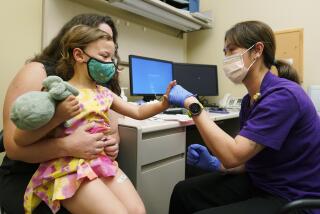Family Presence Helps Trauma Patients
- Share via
DALLAS — Patients are comforted and believe they get better treatment if a relative is with them during invasive procedures or cardiopulmonary resuscitation in the emergency room, a study found.
Patients said they felt soothed, protected and less frightened with a family member present.
“Family members gave them strength when they were afraid and in pain,” said Dezra Eichhorn, a trauma nurse at Parkland Memorial Hospital and lead author of the study “Hearing the Voice of the Patients.”
The small study was conducted by Parkland nurses and published in the May issue of the American Journal of Nursing.
The subject of “family presence” is controversial in the medical community because some doctors believe that relatives may interfere or be more likely to pursue malpractice litigation.
Dr. Stephen Epstein, who was not involved in the study, said family members may get hysterical, combative or faint.
“You have no idea how they will react,” said Epstein, a doctor at Beth Israel Deaconess Medical Center in Boston. “My focus needs to be on that patient, not on family members who are there. The major issue is taking care of that patient and not being distracted.”
Eichhorn interviewed nine patients treated between December 1996 and April 1998. The patients were taken from a pool of 43 used in a related study last year on how bedside presence benefits patients’ families.
Of the 43, 24 died and 10 were unable to be interviewed.
Laurie Kidder said her presence in Parkland’s emergency room probably saved her daughter’s life three years ago. Ashley Keeling, then 15, was struck by a car and suffered a broken leg and crushed pelvis. Ashley had a history of medical problems, including damage to her digestive organs and lungs.
Kidder was able to provide Ashley’s background to the trauma doctors, along with offering reassurance to the teen.
“The doctors were saying medical words that I didn’t understand. She told me what was going to happen and held my hand,” Ashley said. “I began thinking, ‘I’m going to be OK. They know what they are doing.’ ”
Most hospitals do not have written policies governing family presence.
The Parkland hospital policy allows medical staff to decide on family presence on a case-by-case basis.
“We don’t support taking everyone in,” Eichhorn said. “For some people this is not the right thing.”
The study found that some patients felt they received better care because a relative acted as their advocate. “They felt the [medical team] saw them as a person and not an injury or diagnosis,” Eichhorn said.
The patients also said they believed it was their right to have a loved one present.
Dr. Ian Cummings, president of the Assn. of Emergency Physicians, said children especially benefit.
“There’s nothing more frightening than being in a health-care setting. Having family there, even during a potential terminal illness, is crucial,” said Cummings, a physician at Day Kimball Hospital in Putnam, Conn., who was not involved in the Parkland study.
He said fears of malpractice are unfounded.
“You’re probably better off this way. Patients with a good relation with their caregiver are less likely to sue,” he said.
Some patients may not want a family member present, wrote Thomas Schwarz, editorial director of the American Journal of Nursing. In an opinion piece in the May issue, he wrote that he would not want his own teenage son to witness such trauma.
“The site of my splayed face, the chaos of resuscitation, the pandemonium of odors, colors, urgent voices and discordant mechanical sounds, and his probable desperation at being powerless to help his Dad would, I fear, haunt him ever afterward.”
However, Eichhorn said the previous study that looked at the effect on family members found that most relatives of patients who died said they were thankful for a chance to say goodbye. And medical providers generally believe that dying patients also benefit, she said.
“In a person’s last moments in life, it’s very significant for them to have family with them,” she said. “Just like when they came into this world, they want the family unit with them.”






